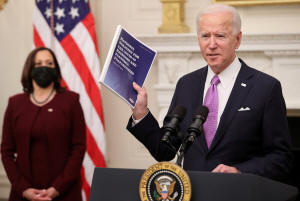Biden to push U.S. Congress for money to fight pandemic globally
 Send a link to a friend
Send a link to a friend
 [January 22, 2021]
By Michelle Nichols [January 22, 2021]
By Michelle Nichols
NEW YORK (Reuters) - The United States will
back a global plan to combat COVID-19 and get vaccines to poorer
countries as part of a national strategy unveiled by President Joe Biden
on Thursday, which includes pushing Congress for more funding for
international efforts.
Global re-engagement has been among Biden's priorities since taking
office on Wednesday and one his first actions was to rescind former
President Donald Trump's planned withdrawal from the Geneva-based World
Health Organization (WHO).
Under the U.S. COVID-19 strategy, Biden will direct his secretary of
state and secretary of health and human services to notify the WHO and
the GAVI vaccine alliance of Washington's intent to support the Access
to COVID-19 Tools (ACT) Accelerator and join its COVAX facility.
Vice President Kamala Harris spoke with WHO Director-General Tedros
Adhanom Ghebreyesus on Thursday about Washington's plans, the White
House said.

The ACT-Accelerator programme and its COVAX facility are the global plan
to tackle the pandemic, aiming to deliver 2 billion doses of coronavirus
vaccines by the end of 2021, 245 million treatments and 500 million
tests. The first vaccine batches are expected to go to poorer countries
in February.
"The Biden-Harris Administration will seek funding from Congress to
strengthen and sustain these efforts, as well as other existing
multilateral initiatives involved in fighting COVID-19," according to
the strategy, which also calls for Washington to work on a way to donate
any future U.S. vaccine surplus.
[to top of second column]
|

President Joe Biden speaks about his administration's plans to fight
the coronavirus disease (COVID-19) pandemic during a COVID-19
response event as Vice President Kamala Harris listens at the White
House in Washington, U.S., January 21, 2021. REUTERS/Jonathan Ernst

In December the U.S. Congress allocated $4 billion for the global
response to the pandemic, including vaccine procurement and
delivery. But Biden's nominee for secretary of state, Antony Blinken,
warned that "additional resources are likely to be to be needed."
So far the ACT-Accelerator has received $6 billion and the U.S.
pledge of $4 billion, but still needs another $23 billion.
Blinken said it was in the U.S. national interest to make sure
vaccines are effectively and quickly distributed globally.
"We're seeing the potential for a debt crisis among emerging
economies and developing economies. We're seeing public health
crises in country after country because COVID has made it more
difficult to provide other health services," Blinken said.
"We're seeing state fragility increase, not decrease ... so we have
actual interest in helping," he said on Tuesday.
Blinken also described WHO as an "imperfect organization in need of
reform," but said it was better to tackle it as a member. Trump had
cut funding to the WHO last year and announced plans to quit the
body over accusations it was a puppet of China, which WHO denied.
(Reporting by Michelle Nichols in New York; Editing by Matthew
Lewis)
[© 2021 Thomson Reuters. All rights
reserved.] Copyright 2021 Reuters. All rights reserved. This material may not be published,
broadcast, rewritten or redistributed.
Thompson Reuters is solely responsible for this content.
 |